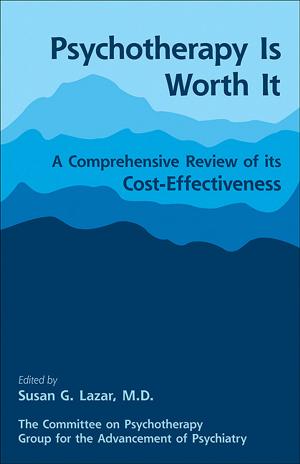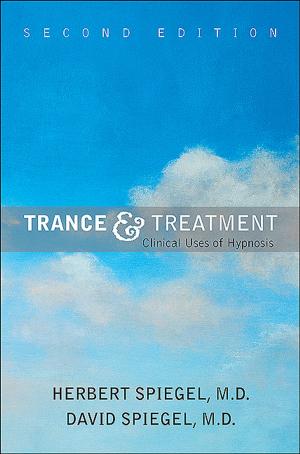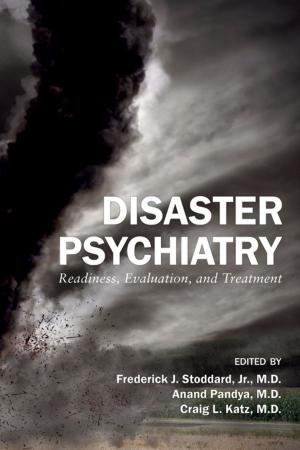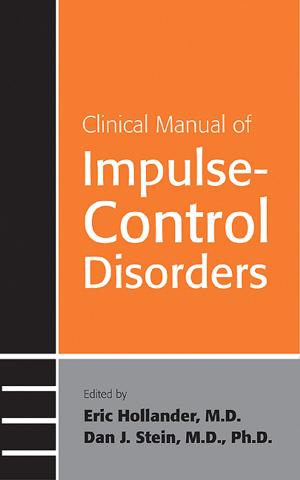Treating Trauma Survivors With PTSD
Nonfiction, Health & Well Being, Medical, Specialties, Psychiatry| Author: | ISBN: | 9781585627844 | |
| Publisher: | American Psychiatric Publishing | Publication: | August 13, 2008 |
| Imprint: | American Psychiatric Association Publishing | Language: | English |
| Author: | |
| ISBN: | 9781585627844 |
| Publisher: | American Psychiatric Publishing |
| Publication: | August 13, 2008 |
| Imprint: | American Psychiatric Association Publishing |
| Language: | English |
In recent years, considerable research, as well as clinical guidelines based on study findings, has been published on the treatment of posttraumatic stress disorder (PTSD). A gap remains, however, between the controlled environments and protocols used in intervention research and the more complex and often imperfect settings and situations that clinicians must navigate in daily practice. Moreover, clinicians routinely see patients whose comorbid substance abuse, self-destructive behavior, or medical illness would likely exclude them from research studies. In short, although the extensive literature is certainly helpful in articulating the various treatment modalities available to clinicians, the strength of the evidence for the efficacy of the treatments, and the recommendations and personal preferences of experts, the literature does not address the real-life dilemmas that clinicians face in attempting to treat trauma survivors.
What is needed is a way to bridge the gap between research and practice -- to "translate" study findings into everyday clinical realities. Treating Trauma Survivors With PTSD answers that need. Its authors, experienced researchers and clinicians who are at the forefront of conceptual discourse on trauma and PTSD, are uniquely qualified to offer guidance on these issues. Among the specific topics covered are the following: Diagnosis and assessment of and treatment planning for trauma survivors with PTSD, including clinical presentations related to trauma exposure and PTSD and the implications of comorbid symptoms and disorders Treatment matching in clinical practice -- how treatment outcome findings can be used to develop profiles for predicting which patients are most likely to respond to which treatments Medications useful in the treatment of PTSD and the strength of the empirical evidence for their efficacy Trauma in children and the efficacy of various treatments, including a discussion of how treatment for children differs from that for adults Assessment and treatment of multiply traumatized patients -- those with both recent trauma and a history of childhood trauma or abuse Treatment of trauma survivors in the acute aftermath of traumatic events, including a review of some of the exciting developments in the field regarding risk factors (e.g., normal vs. pathological coping responses) that influence which individuals are most likely to develop PTSD after such events.
These topics have never been more relevant than now, in the wake of the attacks that shook our country on September 11, 2001. It is the authors' hope that by reading this book, mental health practitioners will gain more confidence in applying the specialized techniques described in empirical studies to their own practices and clinical realities.
In recent years, considerable research, as well as clinical guidelines based on study findings, has been published on the treatment of posttraumatic stress disorder (PTSD). A gap remains, however, between the controlled environments and protocols used in intervention research and the more complex and often imperfect settings and situations that clinicians must navigate in daily practice. Moreover, clinicians routinely see patients whose comorbid substance abuse, self-destructive behavior, or medical illness would likely exclude them from research studies. In short, although the extensive literature is certainly helpful in articulating the various treatment modalities available to clinicians, the strength of the evidence for the efficacy of the treatments, and the recommendations and personal preferences of experts, the literature does not address the real-life dilemmas that clinicians face in attempting to treat trauma survivors.
What is needed is a way to bridge the gap between research and practice -- to "translate" study findings into everyday clinical realities. Treating Trauma Survivors With PTSD answers that need. Its authors, experienced researchers and clinicians who are at the forefront of conceptual discourse on trauma and PTSD, are uniquely qualified to offer guidance on these issues. Among the specific topics covered are the following: Diagnosis and assessment of and treatment planning for trauma survivors with PTSD, including clinical presentations related to trauma exposure and PTSD and the implications of comorbid symptoms and disorders Treatment matching in clinical practice -- how treatment outcome findings can be used to develop profiles for predicting which patients are most likely to respond to which treatments Medications useful in the treatment of PTSD and the strength of the empirical evidence for their efficacy Trauma in children and the efficacy of various treatments, including a discussion of how treatment for children differs from that for adults Assessment and treatment of multiply traumatized patients -- those with both recent trauma and a history of childhood trauma or abuse Treatment of trauma survivors in the acute aftermath of traumatic events, including a review of some of the exciting developments in the field regarding risk factors (e.g., normal vs. pathological coping responses) that influence which individuals are most likely to develop PTSD after such events.
These topics have never been more relevant than now, in the wake of the attacks that shook our country on September 11, 2001. It is the authors' hope that by reading this book, mental health practitioners will gain more confidence in applying the specialized techniques described in empirical studies to their own practices and clinical realities.















